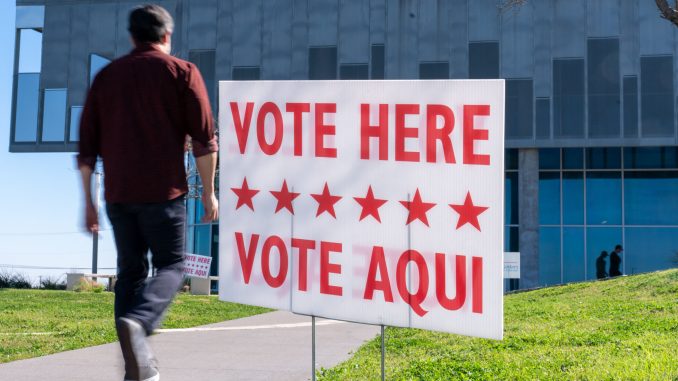
FIRST ON THE DAILY SIGNAL—Ranked choice voting causes thousands of votes to get “trashed,” contends a new video by a government watchdog set for release Wednesday—one day after Super Tuesday, when 15 states hold presidential nominating contests.
The Foundation for Government Accountability provided the video to The Daily Signal ahead of Super Tuesday, which sees voters in the only two states with ranked choice voting laws—Alaska and Maine—cast ballots.
Several counties and municipalities also use ranked choice voting, including the largest, New York City, for local primary elections.
Kansas and Wyoming—which don’t vote on Super Tuesday—have adopted the system only for presidential primaries.
In the 15 states with contests Super Tuesday, President Joe Biden faces Democrat challenger Rep. Dean Phillips, D-Minn., and former President Donald Trump faces his final remaining Republican opponent: his former ambassador to the United Nations, Nikki Haley, also a former South Carolina governor.
The video from the Foundation for Government Accountability shows voters riding on a yellow bus, which comes to a fork in the road between traditional elections and ranked choice voting. The bus takes the route of ranked choice voting.
A narrator asks: “Would you still head to the polls if you knew your vote was just going to get thrown in the trash?” The narrator later adds: “Ranked choice voting destroys everything we know about free and fair elections.”
Ranked choice voting is a system that allows voters to rank a first, second, and third choice—or more. A voter casting such a ballot, for example, might select three candidates in order of preference out of six candidates for a congressional seat.
Also known as an instant runoff, counting would go into subsequent rounds if no candidate gets more than 50% of the vote.
The narrator of the video contends that in Alaska and Maine, Democrats disproportionately have won general elections, asserting: “Ranked choice voting almost always ends in extreme partisan victory for the Left.”
My book “The Myth of Voter Suppression” documents various cases in which politicians on the Left have changed election laws for their own electoral benefit.
In most states, the two major political parties set the rules for primary elections. Maine Republicans have the options of five presidential candidates still on the ballot (most states don’t remove candidates who have dropped out of a race). However, the Maine Republican Party said it will ignore the ranked preferences and award delegates to the Republican National Convention only to the first choices. Democrats will be able to rank both presidential candidates.
In either case, both primaries in Maine have only two candidates still competing for votes, which makes it unlikely anyone would get less than 50% of the vote even if the polls weren’t lopsided.
“In Maine, voters will see RCV [ranked choice voting] on their ballots for the presidential primary,” says a post about Super Tuesday by FairVote, a leading advocate of the system, adding later: “Although the Maine Republican Party has chosen to ignore their voters’ ranked preferences and award delegates based on first choices alone, Maine’s secretary of state will process the ranked ballots according to state law—giving voters greater choice, and giving election observers and campaigns additional insight into voter preferences.”
In Alaska, Republicans are holding a caucus instead of a primary, which won’t be bound by state rules. Democrats aren’t competing in Alaska until a primary set for April 13.
FairVote contends that beyond Super Tuesday, this is “RCV’s biggest year yet,” noting: “Ranked choice voting isn’t just being used on Super Tuesday this year. We’re also watching one of the most significant years yet for RCV—from Alaska’s first use of RCV in its presidential general election to a historic implementation of proportional RCV in Portland, Oregon.”
The narrator of the video from the Foundation for Government Accountability says of ranked choice voting: “The problem is that thousands of votes are trashed along the way to create this supposed majority.” The video then shows images of voters on the bus disappearing in a puff of smoke.
According to the Foundation for Government Accountability, Maine threw out 8,000 votes in 2018; New York City tossed out 140,000 votes in its 2021 primary; and Alaska tossed out 15,000 votes in 2022.
“A much smaller, manufactured pool of voters ends up deciding the election, to the exclusion of other voters,” the narrator of the video says.
In recent years, ranked choice voting has become the subject of one of the most contentious battles in election law as several state legislatures either considered it or banned the voting system.
Proponents, such as FairVote, argue that ranked choice voting will decrease political polarization by producing less extreme candidates in party primaries, give independent candidates a better chance in a general election, and prevent these independent candidates from becoming spoilers.
As of the 2022 elections, the system was used in a total of 62 jurisdictions, including Minneapolis, San Francisco, and Cambridge, Massachusetts, according to the Ranked Choice Voting Resource Center.
Some states with presidential nominating contests on Super Tuesday allow ranked choice voting at the local level, which doesn’t affect those federal contests. According to Rank the Vote, these include seven local jurisdictions in California, over 20 jurisdictions in Utah, five cities in Minnesota, four cities in Colorado, and three jurisdictions in Massachusetts.
Have an opinion about this article? To sound off, please email letters@DailySignal.com, and we’ll consider publishing your edited remarks in our regular “We Hear You” feature. Remember to include the URL or headline of the article plus your name and town and/or state.

